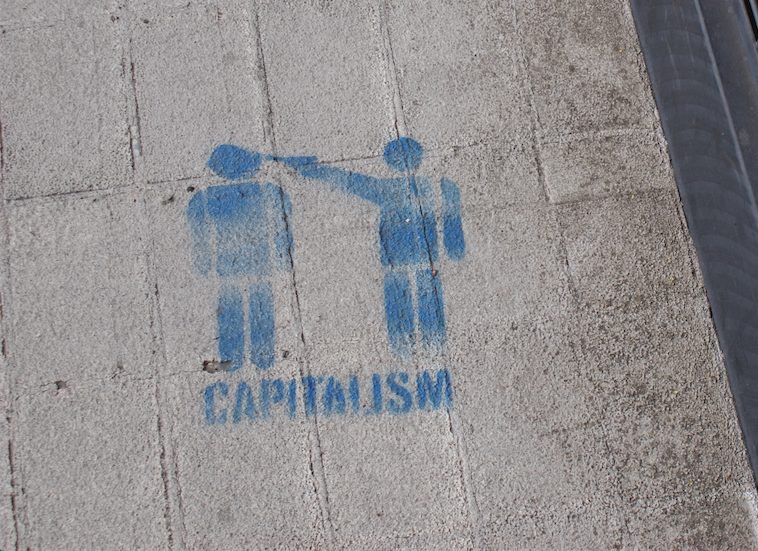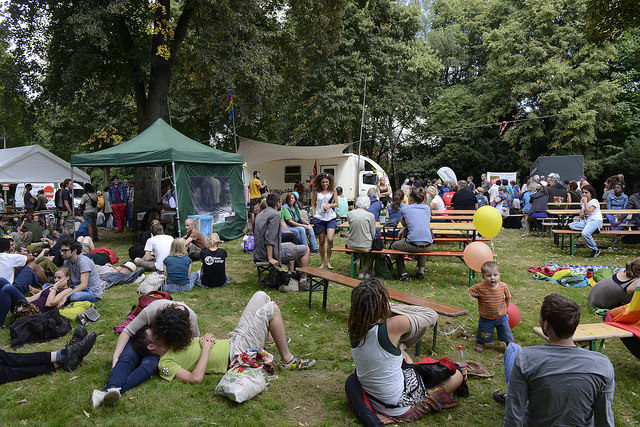The following article is a translation from the forthcoming “Atlas der Globalisierung”, that will be edited by Le Monde diplomatique and the Kolleg Postwachstumsgesellschaften (Universität Jena) under the title “Less is More. The Postgrowth-Atlas” (“Weniger wird mehr. Der Postwachstums-Atlas”. Postwachstum. Degrowth. Décroissance. These are buzzwords of a newly emerging social movement of activists and academics who criticize the dominant development model of continuous capitalist and material growth in industrialized countries. Most characteristically, however, they search for alternatives – which different approaches are discussed?
The critique of economic growth is almost as old as growth itself. It became particularly pronounced with the growing awareness of the finiteness of resources on this planet. The first report to the Club of Rome in 1972 provoked a fundamental societal discussion about the “Limits to Growth”, which has never really subsided since. The most important new impulse in the 21st century came from the décroissance- or degrowth-movement, which has spread from France to Spain, Italy, and the English-speaking world. It was also taken up in German-speaking countries. Yet since a direct translation is impossible, different terms such as “Wachstumsrüchnahme“, “Postwachstum“ or “Ausgewachsen“ are used. All these critiques are not only directed against the assumption of endlessness underlying neoclassical growth economics, but also against green Keynesian attempts to bring the crisis-ridden Western economies on a new growth curve through a Green New Deal or a Green Economy.
Critique of green growth
In German-speaking countries these discussions developed into a varied field of different positions on the social-ecological transformation. They all criticize the technological optimism of the 1990s – the idea that through eco-efficient technologies green production and green consumption could be decoupled from ecological destruction and overuse. Ecological justice, so one key argument, can only be realized by ending the imperial mode of living and thus economic growth in the global North.
The second common ground lies in the attempt to develop concrete utopias as alternatives to the growth diktat and to connect these to disobedient practices and alternatives modes of living. Inspired by such different sources as ecological and feminist economics, the critique of development policies, and debates about the “good life”, different approaches seek to conceptualize a social-ecological transformation for the highly industrialized countries. The degrowth-debate thus addresses the rich countries in the global North, even though social movements in the global South are important allies (e.g. grass-roots environmentalism of the poor and debates about the Buen Vivir). In industrialized countries, resource-, energy-, and land-use as well as the accumulation of waste and emissions are to be reduced to a level that is sustainable in the long-term and that leaves space for a just development for people in the global South,
Within capitalist social and economic structures an all-out reduction of GDP would spark economic crises – a rapid rise in unemployment, debt, poverty, and an overall reduction in the quality of life, such as experienced currently in the Southern European countries suffering the consequences of economic decline and austerity measures. Thus degrowth proposals aim at concrete transformations in economy and society that are geared towards human needs, the “good life” and genuine ecological sustainability and which as a result lead to a stabilization or reduction of GDP.
Degrowth in Germany – a contested terrain
A new wave of current critiques of growth started to be articulated in German-speaking countries particularly in the context of the world economic crisis since 2008, and they experienced a first climax with the large and popular 2011 conference “Jenseits des Wachstums?!” (Beyond growth?!) in Berlin. Next to a renewed academic interest at universities, five approaches with diverging socio-political outlooks, causal analyses, and proposals can be discerned in this recent debate: 1. conservative, 2. social-reformist, 3. sufficiency-oriented, 4. critical of capitalism, and 5. feminist approaches. Even if only some of these currents have connections to décroissance, they will be discussed in this article because they influence the current debates on growth, welfare, and sustainability. This rough sketch can, of course, only be a cursory, abridged, and oversimplified introduction that provides first orientations in a highly complex debate.
Symptomatic for the discussion in Germany is the influence of a neoliberal and conservative variety of growth critique, which has notably been publicized by Meinhard Miegel, consultant to the ruling conservative party CDU and mastermind behind the neoliberal pension reforms. In his books, articles and interviews and in the context of the think tank “Denkwerk Zukunft“ he argues that “we all” have lived beyond our means and thus have to tighten our belts. Economic decline is seen as the inevitable destiny of modern industrial societies, a position Miegel justifies not only ecologically but also with regard to social limits to growth such as demographic change, glutted markets, and the excessive growth of the welfare state. Conservative growth critique advocates the replacement of the welfare state by voluntary engagement, a charity culture, and the reliance on services in the household (which in a patriarchic society are mainly done by women). The critique of growth is thus turned into a justificatory tool and lever for social cuts, privatization, austerity, and a roll-back of gender-relations.
The second approach, which has been particularly promoted by economists Angelika Zahrnt and Irmi Seidl, is social-reformist, ecologically-liberal and closely linked to German environmental associations. It starts from the argument that the political fixation on economic growth is ecologically and morally problematic and it identifies growth-dependent societal and economic institutions and political parties as the key drivers of economic growth. Zahrnt and Seidl demand an end of growth policies and a reduction of energy- and resource consumption according to sustainability goals. The core of their approach is the call for a rebuilding of those institutions and structures that are currently driving or depend on growth. Whether this would result in more growth or an overall reduction in production and consumption is left open. The critique of growth is conceptualized in a structurally conservative way: It does not aim at a fundamental transformation, which comprehensively takes into account societal problems, but rather aims at rebuilding specific institutions such as pension systems, health, education, work, taxes, financial markets, or state finances, insofar as these are dependent on growth. Since the critique of growth is conceptualized as sustainable liberalism, ecological taxation (e.g. on ecologically harmful resource use) is seen as a key instrument of societal change.
Building on this approach, Zahrnt and the president of the “Wuppertal Institute für Climate, Environment and Energie”, Uwe Schneidewind, have developed proposals for a “politics of sufficiency”, politics that make it easier to practice sustainable lifestyles. Both the conservative growth critique à la Miegel and the social-reformist approach of Seidl/Zahrnt do not aim at the voluntary and planned reduction of economic activities aimed at the good life. While the former position sees economic decline as an unavoidable destiny, the second evades the question whether a decoupling is actually achievable.
Global justice and subsistenceTwo other currents see this differently. They deem a fundamental rejection of growth as indispensable and desirable, if ecological goals are to be taken seriously and if global climate justice is not to remain an unrealistic pipe dream. Niko Paech, economist at the University of Oldenburg, has presented an influential model of a “post-growth economics”: Based on the postulate that every single human being has the same right to ecological space (for example 2.7 tons CO2-emissions per person per year), Paech proposes two key drivers for growth: On the individual level consumers who use a disproportionate amount of ecological space (for living, food, transport, technical devices etc.) and on an economic level the division of labor and long value-added chains in globalized markets. Amplified by interest rates this system of “foreign” or “external supply” (Fremdversorgung) enforces economic growth. Based on this analysis, Paech’s degrowth economics is comprised of two pillars: an individual strategy of sufficiency (“liberation from excess”) combined with a radical reduction of external provisioning through a strengthening of regional and local economies and subsistence. The key actors of change are “prosumers”, that is persons who not only consume less but also collectively extend the life-span of existing products through repair cafés or borrowing shops and who engage in forms of self-provisioning (such as urban gardening), and thus practically advance economic localization and decommercialization.
A fourth approach emphasizes the encompassing societal changes that are entailed in a social-ecological transformation and focusses on the relationships between growth, equality, power, and society-nature relations in capitalism. These critiques analyze capital-driven accumulation and the continuous commodification of more and more areas of life through privatization and the extension of markets as the root causes of the multiple crises associated with economic expansion. Solidarity-based degrowth thus aims at rolling back market mechanisms in all spheres of life, at the societal or communal ownership and democratic control of key areas of economic activity, and at the dismantling of asymmetries in power and wealth. Key building blocks are commons based economies, a strengthening of solidarity economies, a radical reduction and sharing of working time, a re-focusing on reproductive activities and principles, and both unconditional basic income and upper limits for maximum incomes. With a somewhat different orientation, debates around “Eco-socialism” aim at overcoming capitalism and industrial societies through planned economic contraction, the nationalization of the means of production, and individual sufficiency.
The fifth approach is feminist economics and in particular the subsistence perspective. Even though these perspectives were not developed as explicit contributions to the degrowth debate, they form vitally important contributions to the discussion and are important sources of inspiration. Feminist economists explain the social and ecological crises with reference to patriarchal and capitalist exploitation of (female) reproduction, of nature, and of the (postcolonial) economies in the global South. In particular the long tradition of critiques of GDP has revealed how fundamentally the growth paradigm devalues all the work beyond the market (i.e. child raising, care work). Feminist perspectives on the critique of growth, on the other hand, aim at putting these activities, which form the foundation for society and life itself, at the center. Key principles are precaution, cooperation, and the orientation towards what is necessary for the good life.
 Conflicting visions
Conflicting visions
Internationally, the three International Degrowth Conferences on Ecological Sustainability and Social Justice 2008 in Paris, 2010 in Barcelona, and 2012 in Venice, at which activists and academics have worked on developing common positions, have strongly advanced the degrowth movement. The fact that this continuous working process is now coming to Leipzig with the fourth International Degrowth Conference in September 2014 demonstrates that the debate has taken hold in Germany. The critique of growth is indeed a contested terrain with partly conflicting outlooks. And even though positions critical of growth have been taken up by many groups of the German environmental movements, it is difficult to identify the societal actors that could advance such fundamental changes. Nonetheless, the practices which are developed in these various debates together with the established movements and groups such as Transition Towns, projects of the solidarity economy, or climate and energy activists build an essential foundation for the formation of a degrowth movement. Hopefully, in the coming years these degrowth- and post-growth perspectives will engage in current conflicts more, such as the energy struggles around the largest European brown coal field now developed in the Rhineland or in the Lausitz, refugee struggles, protests against the free-trade and investment agreements (TTIP etc.), fights for the right to the city, and resistance against the authoritarian transformation of the European Union.
> Comment on this article on the German blog "Postwachstum"
On October 1st, Ecuadorian President Lenin Moreno announced a series of economic measures for the country, including the elimination of gasoline and diesel subsidies and the liberalization of their prices, as part of an agreement with the International Monetary Fund (IMF). These measures led to the eruption of massive nationwide protests for eleven consecutive days, which were met by the govern...

When the BBC asked me if I would participate in a debate panel on climate change, capitalism and democracy, I first panicked and then said yes. All I really wanted to do this week was finish up and (re)submit some research I started a long time ago. This research shows that, despite their massive growth, energy and carbon emissions cannot (statistically) explain improvements in international li...

Impressions from the degrowth summer school and the Rhineland climate camp It's now for the second time that the Degrowth Summer School took place at the climate camp in the coal-mining region of the German Rhineland with around 800-900 participants. Last year it had mainly focused on the topic of climate justice and on bringing the two movements – degrowth and climate justice – together. This...